I will be honest about why I am writing this post on self-editing. It’d been brewing inside me for a while now. I have been witness to an acute lack of knowledge of the need for self-editing in authors, fresh and seasoned, alike. I won’t go into the reason behind the lack of self-editing. Instead, let’s try and understand why your manuscript needs it, how can you go about doing it easily, and what happens when you send the manuscript ahead without a round of self-editing.
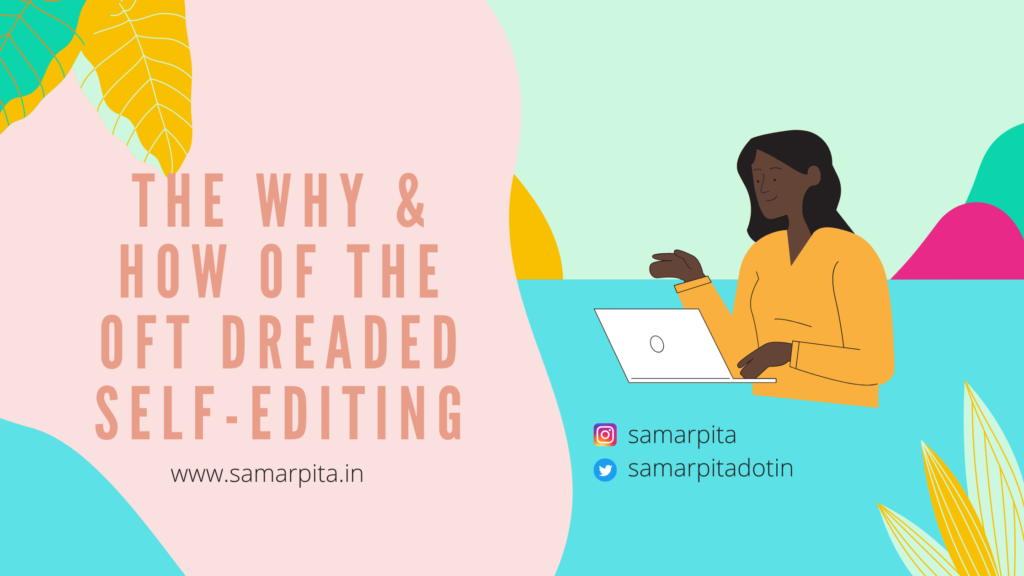
UGHHH, No!
Writing a book is no easy task, even for those who have successfully written and published many books. And once the book has been written from cover to cover, the sense of accomplishment is high. I get it. Going back to what you have written and gone down the rabbit hole of finding faults in your writing is not always a pleasant idea.
Also Read: Reasons Why You Need A Professional Beta Reader For Your Manuscript
I have seen few established authors say that they don’t self-edit. I cannot comment on that, but what worries me is that this is read by new authors and possibly followed as a part of their writing process – and that is how people get misled with half-information.
This post is just to throw some light on why every manuscript must go through at least one round of self-edit done by the author, and how beneficial it would later prove to the process of actual editing.
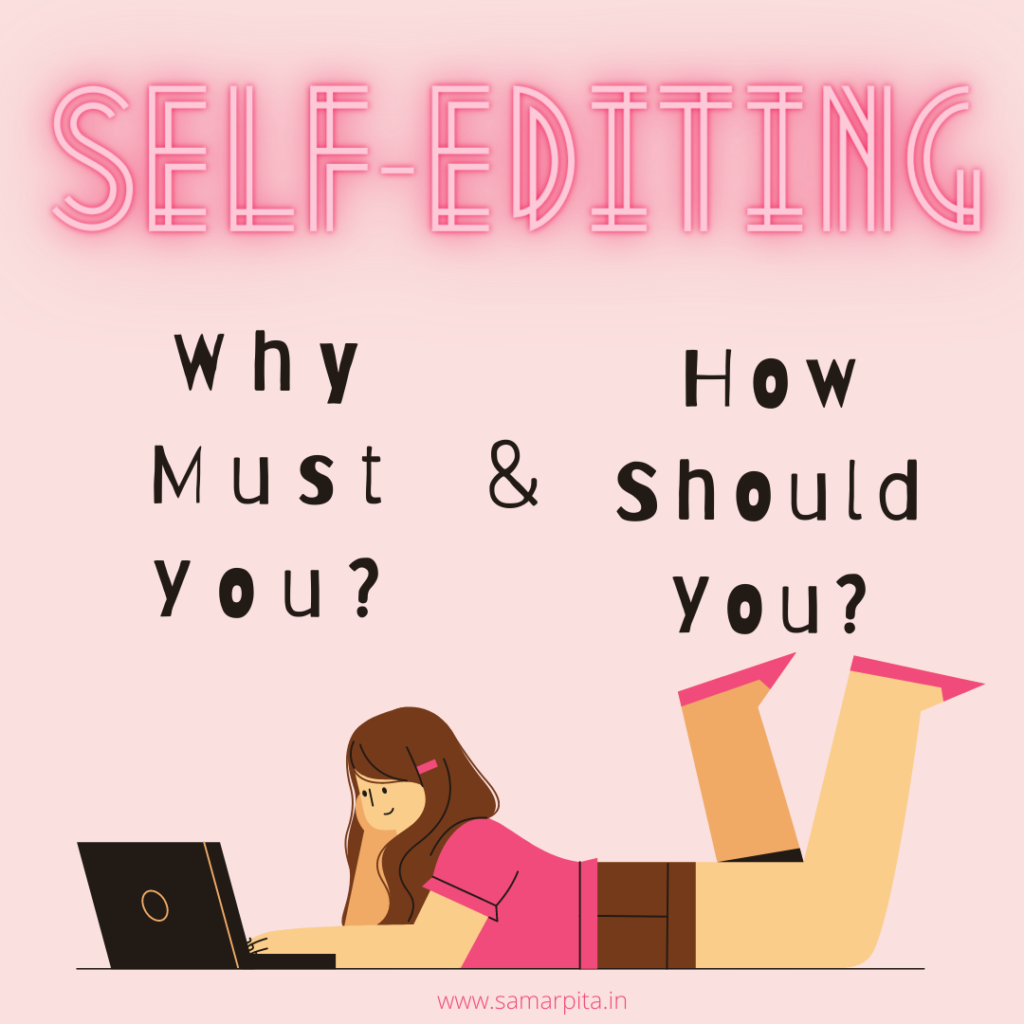
But, it’s a waste of time!
Self-editing can be a drag. I know, I understand. I cry when I have to self-edit. (I shall have to self-edit this post before publishing it and I am already dreading it.) It can get boring. And what is worse is that during self-edit you might want to trash the entire manuscript, hate it, hate yourself, decide never to write again, and go on a royal trip on imposter syndrome.
Also Read: A 5-Step Basic Guide To Editing Your Own Manuscript
Don’t let this scare you. If you find parts in your manuscript that you don’t like, that is actually to your advantage. Now is a good time to reimagine and rewrite the section that doesn’t seem to be working for you.
As a rule, the editor should not be handed the rough draft that you have just completed and haven’t gone through. Editing is not a cheap process and for the money your editor shall charge, it is only wise that you use their expertise rather than have them correct spellings, remove extra spaces, format the document, put header/footer/margins, and other necessary yet mundane jobs that don’t require an editor’s expertise.
When I receive manuscripts that have not gone through self-edit, the entire first round of editing which is also the most crucial round of editing is spent in correcting things just to make the document readable and edit-able. The actual editing that is also done on the parallel is impossible to be 100 % because attention gets divided.
Also Read: 10 Things To Remember When Your Manuscript Is Being Edited
One would say how unfair that is to a paying customer and they’ll be finding me agreeing to it very vocally. It is unfair. When you send manuscripts without basic self-editing, you do many disservices to your manuscript by dividing the editor’s attention and skills and diverting part of it towards correcting silly mistakes.
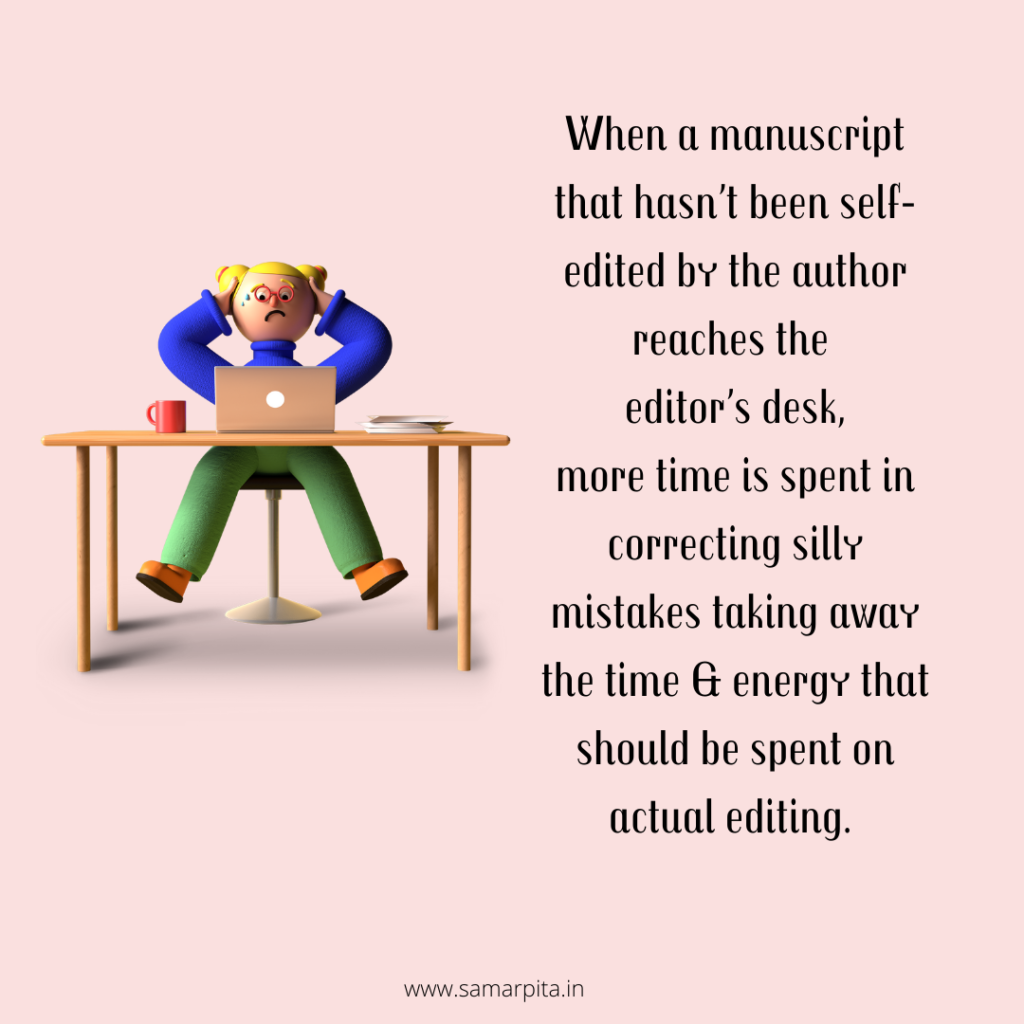
Don’t let laziness or the overwhelming idea of what self-editing might make you do, put you off this important step in publishing your book. Here is a read-reckoner you can refer to every time you are about to begin this step. Tick all the points below, and your manuscript is ready to be sent to the editor.
Ready-reckoner for self-editing:
* Once you know that the manuscript is ready and you have nothing new to add, step away from it. Close the file and don’t open it for at least a week. Let the story get old, it shouldn’t be fresh when you start reading it. This gap is important, my advice is to not hurry here.
* After 7-10 days, return to your draft. Now start reading it as a reader, not as its author. This will help you look at it as an outsider, someone who has no attachment to it. Your eyes and mind will start spotting mistakes. Disassociating from what you have written is also a good way to critique the writing.
* Run a spell-check. Read each correction suggested as depending on the system you are working on, the suggestion could be conflicting with the kind of English (US/global/Australian etc) you are writing in. Make note that the entire manuscript has the same type of English. (Your editor will also be checking this for any stray spelling that might be left uncorrected, but expecting them to locate and correct every such word is too much).
* Delete extra spaces. There are bound to be a few left behind and your editor/proofreader will spot them. But a manuscript with 100 or so extra spaces throughout will waste the editor’s time. Such things usually happen if the story or parts of it are written in notepad or apps other than MS Word/Spaces, and then pasted to these applications.
.
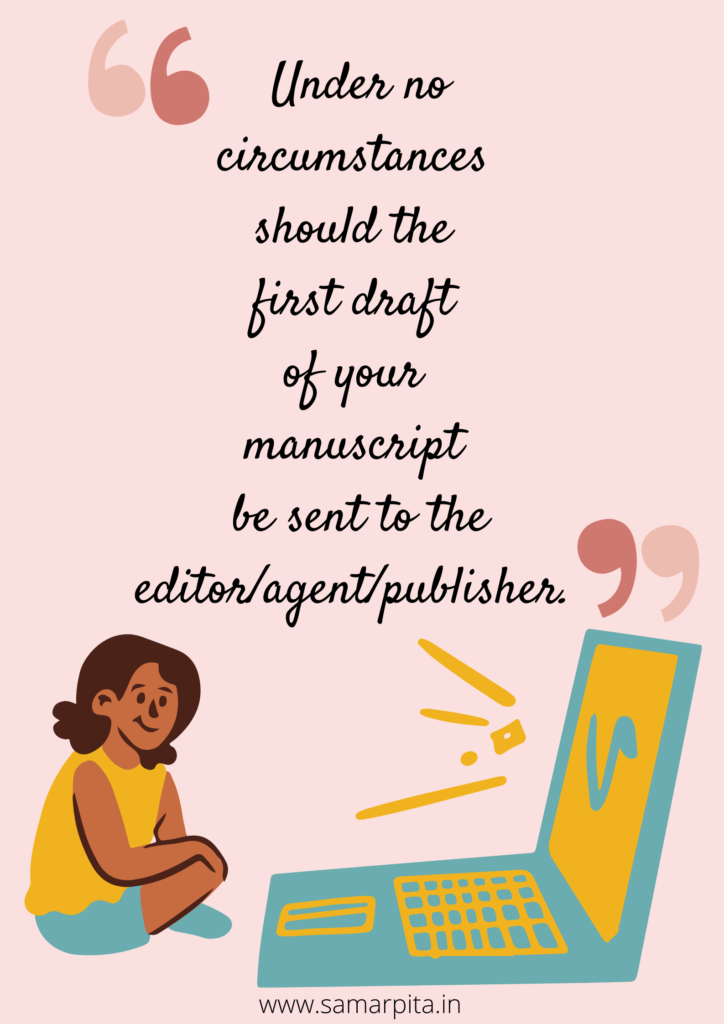
* Read out loud. Listening to the words helps register better and at times our ears catch what the eyes miss. Sometimes it might be errors and at other times you might want to change a sentence/paragraph/section after hearing what it sounds like. Don’t get ruffled, this is good. If it doesn’t sound right to you, the author, chances are it wont sound right to the reader as well. So go ahead, read it out loud until you like how the words flow.
* Check adverbs. Here is a small exercise – spot adverbs in this post and see how you could have written those sections better! There are bound to be some adverbs in your writing – the essential ones, that justify their existence there. But apart from that, use precise verbs and nouns so that you don’t need to use adverbs.
* Always choose active voice. The subject of the sentence should be in the front part of your sentence. If you have time in hand, try to spot passive words in this post and rewrite them in active voice. Let me know in comments, and we can have a chat about how to handle these easily, if you wish!
Also Read: How To Become A Pro At Content Creation Right From The Beginning
* Just self-editing isn’t enough. You could be brilliant in the language but the fact is that an experienced editor can do magic on any manuscript, and your draft is no exception. Find one that suits your requirement and see what they can do for your manuscript.
If you are reading this post and have reached this part, it is a given that you know I am a professional manuscript editor. If you want your manuscript edited, evaluated, help with ideating or writing, or even a ghost writer – drop me an email to editor@samarpita.in and we can have a conversation. There is so much I want to share about writing, editing, and social media for authors – I have so many informative posts planned for the next few weeks – hope you find them helpful. If you do, or if there are things under these topics that you’d want me to write in detail about, leave me a message in the comment box and I promise I will create that content for you.
You can also hop over to author.to/Samarpita and check out my ebooks on how to write better and make a social media presence before your book hits the market. The books are FREE on Kindle Unlimited.

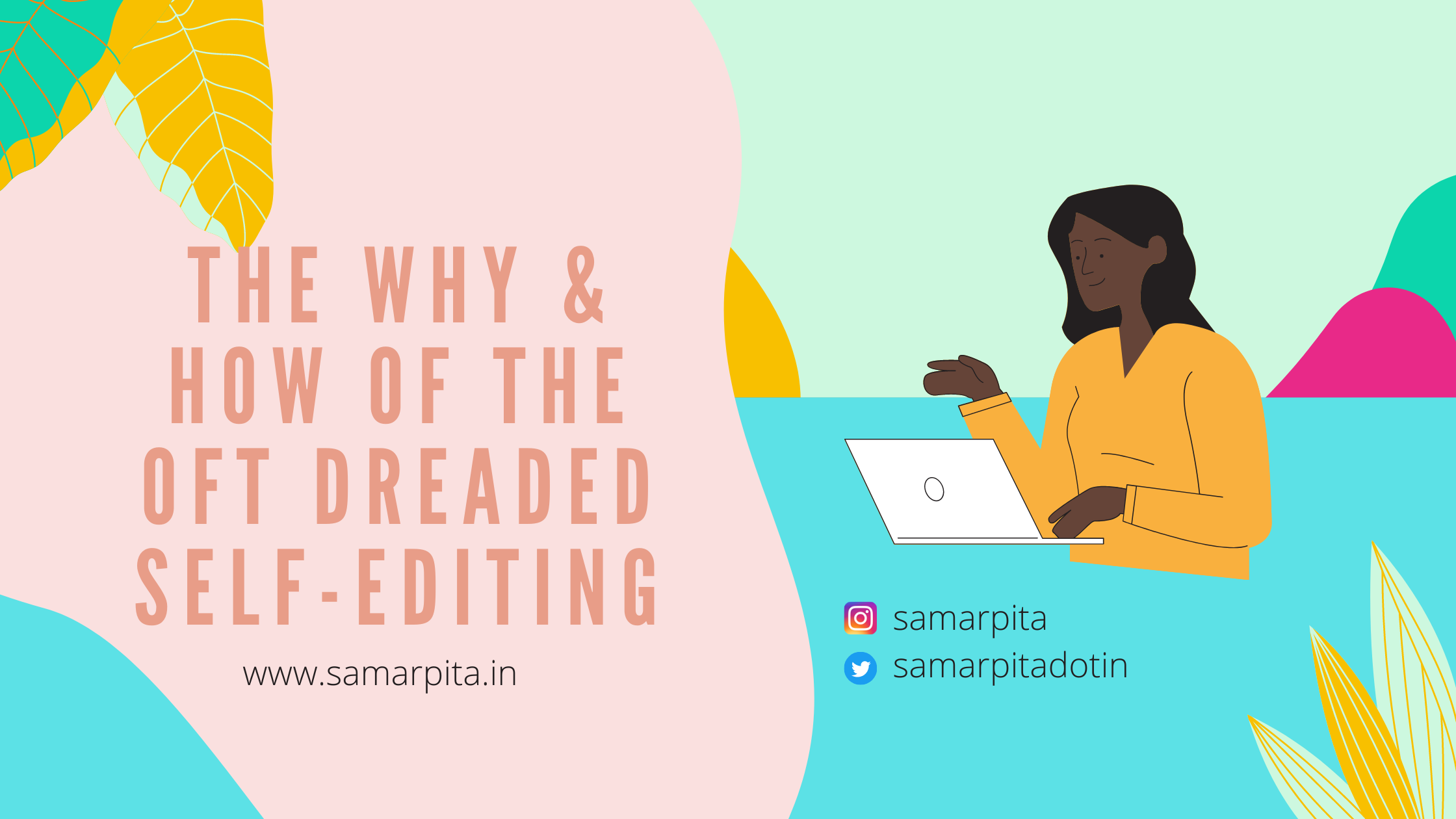
These are excellent tips, Sam! They’d work great for bloggers, too, and make for more wel-written posts, which are always much more pleasurable to read!
Excellently Written!
Very very informative and useful post!!! Thanks yaar
I was nodding my head while reading this article. It is very important to self-edit and you have argued for it very lucidly!
I read your article twice infact and i do get what you are trying to say. Self editing is definitely important, but most of it read like a lament of an editor who has to correct unedited scripts. It was like you telling writers what they do wrong which is obviously a good thing. Hope many can pick up the points you mentioned.
Deepika
It’s always important to get guidance from a professional. A very helpful post.
The is a really informative post. I didn’t know so much was involved in the editing process. I agree with you. The writing should fix silly mistakes so that the editor can concentrate on better things.
Very informative post and indeed some great tips… Love the way you explained everything.
A very helpful and informative post. I have self published books and agree with you. Good to know you are a manuscript editor.
This is such a helpful post with all the valid points. I can imagine how irritating it could get for editors to go through such manuscripts.
Excellent tips
Need for self-editing is well emphasized.
Amazing
Excellent tips. These are very important pointers and yes. self – editing can get tedious and sometimes boring. But I guess I am going to use your tips.
Valuable tips. Self-editing is extremely important. If you can get a good external editor, that’s better. In spite of all this, your book may not make a mark in the market. That’s destiny.
Samarpita, all the tips coming from you are so valuable in the writing process. This point is helpful to return to draft after few days as when we read our draft again and again we tend to overlook mistakes.
Really loved your tips Samarpita! thank you for sharing them with us, buddy, I agree an editor must get the manuscript only after self-editing by the author.
You get un-edited manuscripts? Holy moly. I’m petrified of sharing my manuscripts even after I have edited them several times! I also didn’t know writers find self-editing a chore. It’s my favourite activity 😀
I am not an author but I really enjoy reading about the process of writing. As a bibliophile, bad editing can destroy a book for me. Takes away all the fun. Looking forward to reading more from you.
This is a great post! I dread editing my pieces for imposter syndrome engulfs me! But one needs to sharpen the editing skills and for that, I am taking notes from here.
The is a really informative post. I totally agree with you .No matter how tedious it seems self editing i think i would definitely do it to get that satisfaction level before handling to the outsider.
Very good tips Samarpita, these to a large extent hold good for people who are not just looking at writing manuscripts but also blogs, writing from one’s perspective and from a reader’s perspective is the difference we need to get to and I am still learning..
I find self-editing my blog posts a big pain so I can imagine how authors must feel about having to go through their entire manuscript. But, of course, my posts turn out much better when I look at them a second time.
I find reading aloud a really good way to understand how a post sounds. It helps me pick out awkward phrasing or rambling sentences.
Thank you for all the tips! I was wondering if you could talk about using less adverbs and more verbs in detail.
Also, I wanted to understand developmental editing. How is it done?
Excellent tips for new writers.
I am in this situation every time I write a new post for my blog. It’s a tedious job but it can’t be ignored. Initially, I used to skip it but later when I used to read my own post I felt bad.
Self-editing brings so many errors in front of the writer.
My trick is to set up the page with all the grammar checks, fonts etc at the beginning itself, do the spell check once I am done writing and then return to it after a few days. This is where I generally find better ways of writing what I have already written, this system works great for me. #PoojaMahimkarReads
This is a very useful post. Editing can be tedious but we should not give up, your tips will be very handy.
Really well written. Especially the whys.
A very informative and useful read. I have saved this post as I am in a process of writing a book. There were so many essential points that we miss at times. Looking forward to your posts on writing.
Samarpita this is an insightful post. I must say I do already follow quite a few of the steps that you had shared. #tmmreads
A well written post is always good to.read and these tips are really going to help a lot for many of the bloggers.
These are very valid points for anyone who wants to be a writer. I have always gotten back to my story a week later to see it with a fresh perspective. I save the original file and make changes as I started editing it. #MyepicaReads
That is so true.
And giving a gap of a week to your manuscript works wonders for it.
No doubt, editing is required..leaving the script in the corner has worked for me…even I do that sometimes with blog posts
This is such a helpful post for all of us. Will help a lot in all writing projects. Thanks a lot.
Good tips. You are right. Editing is extremely imp as it changes the entire reading experience.
Yes editing plays a major role in writing esp for authors and then bloggers too.
I agree editing is not easy and I am still learning. Great post,I will keep all the points in mind.
That’s really very useful and informative post I must say. Editing is really very important.
I edit my blog posts before and after publishing too. I agree that it is important to have clarity of a story before handing it over hence self-edit is highly advisable.
That’s very informative. Self editing blogs itself is dreadful and I’m not sure how long it takes for a book.
So helpful. Definitely resharing this
Very valuable points. Editing can get tiresome, but it is necessary. Thanks for the tips!
Quite interesting but I can self-edit a million times!! 🙂 Thanks for the tips though…
This is an excellent post about the importance of self editing. Great tip shared here that can really help authors and bloggers alike. Loved it.
I noted many points from your article. It is well explained. I have written a book once and editing it was the most difficult part for me. I believe that this will surely help me in future.
i love the way you’ve simplified editing. It’s indeed a tedious task. My editing left so many errors that i was ashamed of myself LOL.
A very informative and helpful post. I just hope that people do follow it!
These are some amazing tips. I am working on my ebook. And your points are a check list for me. thanks for such informative post
I am editing my book at the moment and I can relate to what you have written. Editing takes more energy than writing and with me is the saturation of the topic. First you do all the hard work of writing then edit then that Zeal is gone. So I take outsiders opinion on that.
Those are some helpful tips.
Those are really good tips. While self – editing can get boring, it is surely one of the most important things for any writer.
so well written. I always do a self edit of what I’ve written. I first edit each para as I write and a final run over the full article before its published on my blog. When I have my doubts, I even ask my friends to read and let me know about any edits if needed. It also annoys me as a reader when I come across books which are poorly edited.
Wonderful points Samarpita. I agree that self-editing is a tedious job, but a must so that we do the justice to the editor (the readers in case of a blog), valuing their time and effort. Great to know that a professional editor. One day, maybe when I plan to publish my writing, I shall avail of your services. Ps: after self editing! 🙂
Agree. Self-editing is very important. Even before you give your manuscript to an editor, I think an author should take the onus of his own writing and edit it himself FIRST. Recently, I read a book that had so many errors, I wanted to throw it away though the story and end was quite good.
These are amazing tips Sam.. They are surely helpful for me too as blogger
Thanks for sharing I am saving it.
Excellent post, Samarpita and I couldn’t agree more. I’m actually quite shocked to learn that established authors don’t feel the need to self-edit before they send their manuscript to editors. It’ll save everyone’s time and improve the overall quality of the book, if the authors self-edit their work first. #MyFriendAlexa #TinaPicks
Well noted, samarpita.